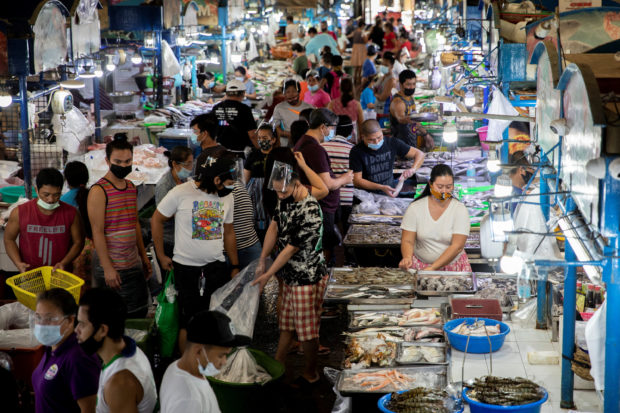No new COVID surge seen despite eased rule on face masks

Vendors and customers wearing face masks for protection against the coronavirus disease (COVID-19) are seen inside a public market in Quezon City, Metro Manila, Philippines, Feb. 5, 2021. (File photo by ELOISA LOPEZ / Reuters)
MANILA, Philippines — The easing of face mask rules in uncrowded outdoor spaces will not lead to a resurgence of COVID-19 infections, pandemic monitor OCTA Research predicted on Tuesday, citing case trends in countries with similar masking policies.
“We’re not expecting a major surge with this [Executive Order No. 3],” OCTA fellow Guido David told reporters a day after the new mask mandate took effect.
“With sufficient population protection, we believe that this EO will not significantly harm the population. We have enough vaccines … and what we are seeing in other countries is that they might see an uptick, but it eventually decreased,” he added, citing infection trends seen in Singapore and South Korea, where masking had also become voluntary.
The country may see a rise in cases but it will “not reach the same level” as when daily infections soared to nearly 40,000 cases during the Omicron surge in January, David said at an online briefing.
Based on its monitoring, OCTA Research observed an uptick in COVID-19 infections in Metro Manila in the past week due to increased mobility.
Article continues after this advertisementBut the Department of Health (DOH) said in its latest bulletin that cases in all areas, except Mindanao, were on a slow downtrend.
Article continues after this advertisementResults from the latest genome sequencing by the Philippine Genome Center from July 15 to Sept. 3 showed that the Omicron BA.5 remains the dominant strain in the country—with 839 samples, or about 86 percent of the total, identified with this more transmissible subvariant.
Set of triggers
OCTA urged the government to define a “set of triggers” that would prompt reimposing the wearing of face masks outdoors should a serious surge in cases happen.
“We also believe that local governments, in their attempt to implement this new executive order, will need guidance from the Department of Health as to when to encourage our citizens to wear masks,” another OCTA fellow, Ranjit Rye, said.
But Health Undersecretary Maria Rosario Vergeire, the officer in charge of the DOH, said that might be unnecessary, since the government is already regularly monitoring COVID-19 indicators nationwide anyway.
“When we reach the point where indicators have increased, such as admissions in hospitals, severe and critical cases as well as deaths, rightfully, the policy will be revised and discussed within the IATF (Inter-Agency Task Force for the Management of Emerging Infectious Diseases) and [that will] be recommended to the President,” she said in her news briefing.
At the Laging Handa briefing, Dr. Edsel Salvana, a member of the DOH’s technical advisory group on infectious diseases, said the number of cases could rise but there would be fewer severe cases.
“[We’ve] been seeing in the last few months that because of the level of our vaccination coverage, even if many get sick with COVID-19 at some point in time, the number of severe cases remains low,” he said.
Good for economy
Go Negosyo Founder Joey Concepcion said the economy could recover faster with the easing of mask rules, as it would bring relief to farmers and workers in outdoor industries.
“[It] would show that the people here are safe,” he said at the Pandesal Forum when asked about the government’s latest policy.
The business leader said requiring people who work outside, such as in farms, to wear masks was absurd.
“In agriculture, are we going to ask them to wear masks in their agricultural lands while planting rice? What is that? It doesn’t make sense,” Concepcion said.
—WITH REPORTS FROM JEROME ANING AND ALDEN M. MONZON
RELATED STORIES
Okay to take off masks outdoors – Bongbong Marcos EO
‘Not yet time’ to make masks optional indoors – DOH chief
To wear, or not wear, face masks vs COVID: The zigzag road PH is taking